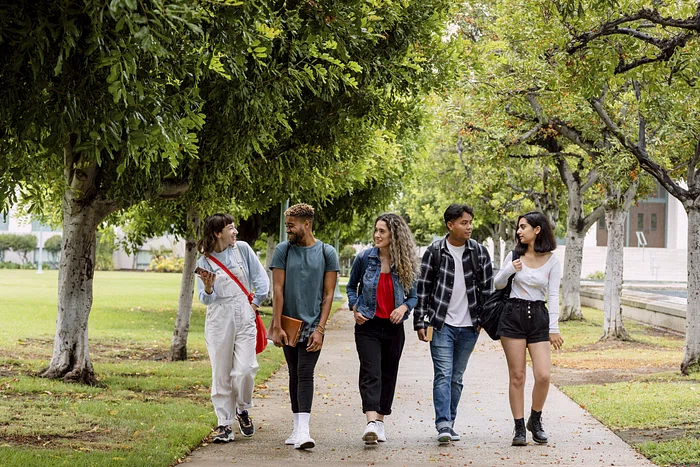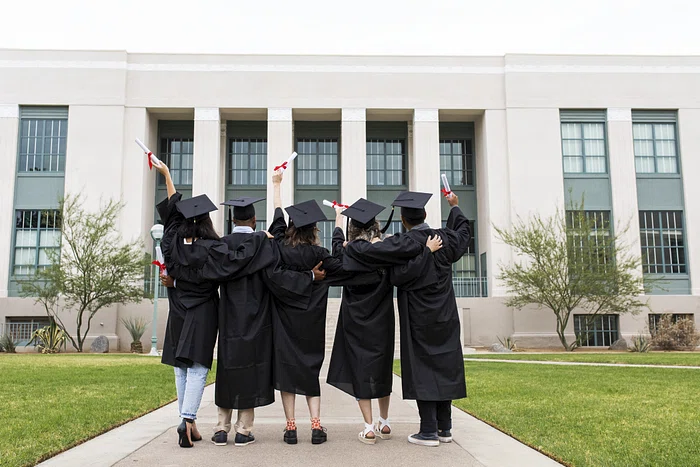College life, they said, would be the best years of your life, right? But here you are, a once-star student feeling like you’ve been tossed into a pressure cooker. If you’re a struggling college kid who used to excel in high school, you’re not alone. The transition from high school to college can feel like stepping into a whole new world, and the pressure to excel can be overwhelming.
The first year of college often comes with a barrage of challenges—academic demands, social adjustments, and newfound responsibilities. It’s a year of self-discovery and growth, but it can also be a year of stress and uncertainty.
But fear not, because in this blog post, we’re going to show you how to release that pressure cooker and not just survive but thrive in your first year of college. We’ll explore the power of mindfulness, the determination of the “Ganbatte” mindset, and practical tips for success. So, whether you’re feeling the heat or just looking for ways to make your college journey even more rewarding, join us as we navigate the labyrinth of freshman year and emerge wiser, stronger, and ready to conquer the world.
Let’s embark on this journey together, and we promise, the best is yet to come.

College is overwhelming, for so many different reasons…
In the high-stakes world of higher education, college students today encounter a myriad of challenges as they embark on their academic journeys. While each student’s experience is unique, some common issues persistently surface:
Academic Pressure: The transition from high school to college can be a shock to the system. Students often face more demanding coursework, increased expectations, and a higher level of academic rigor. The pressure to perform well academically is one of the most common stressors.
Time Management: College life demands effective time management skills. Balancing classes, assignments, part-time jobs, extracurricular activities, and personal life can feel like a juggling act. Poor time management can lead to stress, missed deadlines, and burnout.
Financial Stress: Tuition fees, textbooks, accommodation, and daily expenses can put a significant financial strain on students and their families. Many students worry about student loans and the long-term financial burden they may carry after graduation.
Social Adjustments: College often means leaving the familiar surroundings of home and entering a new social environment. Making friends, fitting in, and dealing with peer pressure can be challenging. Homesickness and loneliness are common feelings.
Mental Health Concerns: The pressure to excel academically and socially can take a toll on students’ mental health. Anxiety, depression, and stress-related disorders are increasingly prevalent among college students.
Balancing Act: Striking a balance between academic responsibilities and social life is crucial, but it’s easier said than done. Overcommitting to either can lead to problems in other areas of life.
Health and Wellness: Neglecting physical health and wellness is a common pitfall. Irregular eating habits, lack of exercise, and inadequate sleep can have a detrimental impact on overall well-being.
Career Concerns: College students often feel pressured to make decisions about their future careers. Choosing a major, seeking internships, and preparing for life after graduation can be daunting.
Diversity and Inclusion: Many college campuses are diverse, and students may encounter issues related to diversity, equity, and inclusion. Navigating these issues and promoting inclusivity can be a challenge.
Technology Overload: While technology offers numerous advantages, it can also be a distraction and a source of procrastination. Finding the right balance in the digital age is an ongoing challenge.
Relationship Struggles: Managing personal relationships can be complicated. Romantic relationships, friendships, and family dynamics can all affect a student’s well-being.
Substance Abuse: Some students turn to substances like alcohol and drugs to cope with stress or social pressures, which can lead to addiction and other health issues.
Understanding these common challenges is the first step in addressing them effectively. College is a transformative time, and with the right strategies and support systems in place, students can navigate these issues and emerge stronger, wiser, and well-prepared for the future.

Understanding the First-Year Pressure Cooker: Navigating Academic, Social, and Personal Challenges
The first year of college is like entering a pressure cooker of new experiences, academic demands, and social adjustments. Understanding the specific challenges that college students face during this crucial phase is vital to finding effective ways to cope and thrive. Let’s dive deeper into the academic, social, and personal challenges that contribute to the pressure cooker effect:
Academic Challenges:
Increased Workload: College courses often require more time and effort than high school classes. The volume of reading, assignments, and exams can be overwhelming.
Higher Expectations: Professors have higher expectations of students’ critical thinking and writing abilities. The transition to more independent learning can be challenging.
Time Management: Learning how to manage time effectively is a skill that many students need to develop. Balancing multiple classes, assignments, and study time can be daunting.
Social Challenges:
Social Integration: College is a melting pot of diverse individuals, and finding one’s social niche can be intimidating. The pressure to make friends and fit in can lead to social anxiety.
Peer Pressure: College often introduces students to new experiences, including parties and alcohol. Peer pressure to engage in certain behaviors can be strong.
Homesickness: Leaving home and familiar surroundings can trigger feelings of homesickness and loneliness, particularly during the first year.
Personal Challenges:
Identity and Independence: College is a time of self-discovery. Students are often faced with questions about their identity, values, and future aspirations.
Mental Health: The stressors of academic and social life can take a toll on mental health. Conditions like anxiety and depression are common among college students.
Financial Strain: Many students worry about the cost of education and financial independence. Balancing part-time work, loans, and expenses can be stressful.
Mental Health Challenges:
The pressure cooker effect is further compounded by mental health challenges that college students often face:
- According to a 2019 survey by the American College Health Association, 60% of college students reported experiencing overwhelming anxiety, while 40% felt so depressed that it was difficult to function.
- The same survey found that 12% of college students seriously considered suicide in the past year.
These statistics underscore the importance of recognizing the mental health challenges that college students confront. The pressure cooker of academic, social, and personal challenges can lead to significant stress and emotional strain. It’s crucial for students to seek support and adopt strategies like mindfulness and the “Ganbatte” mindset to navigate these challenges successfully and emerge from their first year stronger and more resilient than ever.

The Power of Mindfulness in College Life: Finding Balance Amidst the Storm
In the whirlwind of academic pressures and social adjustments, college life can often feel like a storm of stress and anxiety. That’s where mindfulness, a powerful mental tool, comes into play. Let’s explore how mindfulness can be your anchor in the sea of college challenges:
Defining Mindfulness:
Mindfulness is the practice of being fully present in the moment, without judgment. It involves paying attention to your thoughts, feelings, and sensations with curiosity and acceptance. Instead of dwelling on the past or worrying about the future, mindfulness encourages you to savor the richness of the present.
Relevance to Managing Stress and Anxiety:
Stress Reduction: Mindfulness techniques, such as deep breathing and meditation, are scientifically proven to reduce stress. By staying present and focusing on your breath or surroundings, you can calm your nervous system and lower stress levels.
Anxiety Management: Mindfulness helps you detach from anxious thoughts and worries. When you observe these thoughts without judgment, they lose their power over you, allowing you to regain control of your emotions.
Improving Focus and Concentration:
Enhanced Concentration: College demands intense focus, whether you’re studying for exams or working on projects. Mindfulness enhances your ability to concentrate by training your mind to stay in the present moment. This can result in better academic performance.
Reduced Procrastination: Mindfulness helps you become more aware of procrastination tendencies. By recognizing when you’re avoiding tasks and gently redirecting your focus, you can overcome procrastination and boost productivity.
Overall Well-Being:
Emotional Regulation: Mindfulness teaches emotional intelligence. You’ll learn to recognize and manage your emotions, leading to better relationships and a more balanced emotional state.
Improved Sleep: Many college students struggle with sleep. Mindfulness practices can calm a racing mind and improve sleep quality, ensuring you wake up refreshed.
Mindfulness Techniques for College Students: Nurturing Your Inner Peace
In the fast-paced, high-pressure environment of college, nurturing your inner peace can be a game-changer. Mindfulness techniques offer a sanctuary of tranquility amidst the academic storm. Here are some actionable steps to dive deeper into mindfulness practices that can benefit college students:
1. Breathing Exercises:
4-7-8 Technique: Inhale deeply through your nose for 4 seconds, hold your breath for 7 seconds, and exhale slowly through your mouth for 8 seconds. This technique instantly calms your nervous system, reducing stress and anxiety. For more detailed guidance, search for “4-7-8 breathing technique” tutorials online.
Box Breathing: Inhale for 4 seconds, hold for 4, exhale for 4, and pause for 4. Repeat this square pattern several times. Box breathing is effective for immediate stress relief and increased focus.
2. Meditation:
Online Guided Meditations: Numerous resources are available online for guided mindfulness meditation. Apps like Headspace, Calm, and Insight Timer offer a variety of guided sessions tailored to different needs, from stress reduction to sleep improvement. Search for “guided mindfulness meditation for beginners” to get started.
Yoga Nidra: Yoga Nidra, or yogic sleep, is a deep relaxation and meditation practice. It’s especially useful for stress reduction and enhanced sleep. Search for “Yoga Nidra for beginners” to find guided sessions.
3. Mindful Walking:
Walking Meditation Instructions: To practice mindful walking, take short breaks during your day to stroll quietly. Pay attention to each step, the sensation of your feet touching the ground, and your breath. You can search for “walking meditation guide” to find detailed instructions.
Mindful Nature Walks: If you have access to a natural environment, consider mindful nature walks. Engage all your senses—notice the sounds, smells, and textures around you. Connect with the beauty of the natural world.
4. Body Scan:
Body Scan Guided Sessions: Lie down in a comfortable position, close your eyes, and mentally scan your body from head to toe. Pay attention to any areas of tension or discomfort. You can search for “body scan meditation” or “body scan for relaxation” to find guided sessions that lead you through this practice.
Progressive Muscle Relaxation: This technique involves tensing and then relaxing different muscle groups to release physical and mental tension. Search for “progressive muscle relaxation” to find guided exercises.
5. Journaling:
Mindfulness Journal Prompts: Start a mindfulness journal to record your thoughts, feelings, and reflections. You can search for “mindfulness journal prompts for college students” to find creative prompts that encourage self-reflection and growth.
Gratitude Journaling: Focusing on gratitude can enhance your mindfulness practice. Write down things you’re grateful for each day to foster a positive outlook. Search for “gratitude journaling for beginners” to find prompts and tips.
In the tumultuous sea of college life, mindfulness is your lifeboat. It offers respite from the storm, a chance to breathe, and a clear path to navigate the challenges with grace and resilience.
By exploring these mindfulness techniques and incorporating them into your college routine, you’ll find moments of peace and clarity even amidst the chaos. These practices are not just tools for surviving; they’re pathways to thriving in the dynamic world of college life. The Mayo Clinic also has tips and strategies in practicing Mindfulness.

Embracing the “Ganbatte” Mindset in College: Cultivating Determination and Resilience
In the vibrant tapestry of college life, the concept of “Ganbatte” shines as a beacon of determination, perseverance, and resilience. Rooted in Japanese culture, “Ganbatte” embodies the spirit of giving your all, pushing through challenges, and never giving up. Let’s explore how this powerful mindset can fuel your success in the first year of college:
Introducing “Ganbatte”:
The Essence of “Ganbatte”: “Ganbatte” (頑張って) is a Japanese term that encourages relentless effort and determination. It’s a reminder that success often hinges on the willingness to push through adversity, face challenges head-on, and maintain unwavering commitment.
Application to College Life: In the context of college, “Ganbatte” encourages students to embrace the challenges and opportunities that come their way with a spirit of resilience and tenacity. It’s about giving your absolute best, even when faced with academic rigor, social pressures, and personal uncertainties.
The Qualities of “Ganbatte”:
Determination: “Ganbatte” encourages a resolute determination to achieve your goals, whether it’s acing a challenging exam, pursuing a degree, or excelling in extracurricular activities.
Perseverance: The “Ganbatte” spirit reminds you to keep moving forward, even when the journey becomes difficult. It’s about staying committed to your path, no matter how many obstacles you encounter.
Resilience: Resilience is a cornerstone of “Ganbatte.” It’s the ability to bounce back from setbacks, learn from failures, and emerge stronger than before.
Example applications of “Ganbatte” as a college student:
The Determined Scholar: Consider the story of a determined student who faced academic challenges during their first year of college. Despite initial setbacks, they adopted the “Ganbatte” mindset. They sought help from professors, attended study groups, and tirelessly practiced. Through sheer determination, they not only caught up but became one of the top-performing students in their class.
The Resilient Leader: Another inspiring example is a student who faced rejection after rejection when applying for leadership roles in campus organizations. Instead of giving up, they persisted, attended leadership workshops, and continued applying. Their resilience paid off when they were eventually elected as the president of a prominent club.
The Persevering Artist: Imagine a student pursuing their passion for art in college. They encountered numerous setbacks in their creative journey—criticism, self-doubt, and missed opportunities. But they embraced the “Ganbatte” spirit. They continued to create, sought feedback, and entered art exhibitions. Eventually, their artwork gained recognition, and they realized their dream of becoming a professional artist.
These examples illustrate that the “Ganbatte” mindset is not just a philosophy; it’s a practical approach to college life. It’s about facing challenges with determination, persevering through adversity, and emerging from each experience stronger and more resilient than before.
As you navigate your first year of college, remember the spirit of “Ganbatte.” Embrace the challenges, harness your determination, and cultivate resilience. With “Ganbatte” as your guiding principle, you’ll find the inner strength to overcome obstacles, achieve your goals, and thrive in the dynamic world of higher education.

Practical Tips for Thriving in Freshman Year: Your Blueprint for Success
Embarking on your college journey is like setting sail on a vast sea of opportunities and challenges. To navigate these uncharted waters successfully, you’ll need a compass of practical tips. Here’s your blueprint for thriving in your freshman year:
1. Time Management Mastery:
Create a Schedule: Develop a weekly schedule that includes class times, study blocks, and extracurricular activities. Stick to this routine to establish a sense of structure.
Use Time Blocks: Break your day into time blocks dedicated to specific tasks. For example, allocate 2 hours for studying, 30 minutes for a break, and so on.
Prioritize Tasks: Identify your most important tasks each day and tackle them first. This ensures you address your top priorities while you’re fresh and focused.
2. Study Habits for Success:
Active Learning: Engage actively with your study material. Instead of passively reading, try summarizing, teaching, or discussing concepts with peers.
Space Out Study Sessions: Use spaced repetition to reinforce learning. Review material periodically, which enhances long-term retention.
Seek Help Early: If you’re struggling with coursework, don’t hesitate to seek help. Professors, tutors, and academic advisors are valuable resources.
3. Building a Support Network:
Join Clubs and Organizations: Get involved in clubs and organizations that align with your interests. This is a great way to meet like-minded peers and form meaningful connections.
Utilize Campus Resources: Take advantage of campus resources such as counseling services, career centers, and writing labs. They exist to support your academic and personal growth.
Maintain Family and Friendships: Stay connected with your loved ones. Regularly reaching out to family and friends can provide emotional support and a sense of belonging.
4. Self-Care is Non-Negotiable:
Prioritize Sleep: Ensure you get adequate sleep. Sleep is essential for cognitive function, memory consolidation, and overall well-being.
Exercise Regularly: Physical activity boosts mood and reduces stress. Find a form of exercise you enjoy and make it a regular part of your routine.
Mindfulness and Relaxation: Practice mindfulness meditation or other relaxation techniques to manage stress and improve mental clarity.
5. Seek Help When Needed:
Academic Support: If you’re struggling academically, don’t hesitate to ask for help. Professors, academic advisors, and tutors are there to assist you.
Mental Health: College can be emotionally challenging. If you’re experiencing stress, anxiety, or other mental health issues, reach out to the campus counseling center or a mental health professional.
Financial Aid: If you encounter financial difficulties, contact your school’s financial aid office for guidance and potential assistance.
Your freshman year is a journey of growth, self-discovery, and academic achievement. By implementing these practical tips, you’ll not only survive but thrive. Remember, it’s okay to seek help when needed, and self-care is not a luxury but a necessity on this remarkable expedition called college life.

Balancing Social Life and Academic Responsibilities: The Art of Prioritization
In the whirlwind of college life, finding balance between social activities and academic responsibilities is an art worth mastering. Striking this equilibrium is not only key to your success but also essential for your overall well-being. Here’s how to harmonize your social life and academics:
1. The Need for Balance:
-
Avoid Extremes: Extremes are rarely sustainable. A life solely focused on academics can lead to burnout, while an exclusive social whirlwind can hinder your academic progress. Balance is the key.
-
Quality Over Quantity: Remember that it’s the quality of your social interactions that matters most. You don’t need to attend every event or party to build meaningful connections.
2. Effective Time Management:
-
Time Blocking: Use time-blocking techniques to allocate dedicated periods for studying, attending classes, and engaging in social activities. Stick to your schedule as closely as possible.
-
Prioritize Tasks: Each day, identify your most important academic tasks and tackle them first. This ensures you’re making progress even on social days.
3. Setting Priorities:
-
Academic Priorities: Your primary goal in college is academic achievement. Ensure that your academic responsibilities are consistently a top priority.
-
Social Opportunities: While social activities are essential for personal growth and building relationships, they should complement your academic journey, not overshadow it.
4. Building a Support System:
-
Importance of Connection: Your social support system can be a source of motivation, encouragement, and stress relief. Maintain these connections for your overall well-being.
-
Study Groups: Consider joining or forming study groups with peers. This allows you to combine social interaction with academic collaboration.
5. Time for Self-Care:
-
Self-Care Rituals: Don’t forget to make time for self-care, which includes rest, relaxation, and pursuing personal interests. A balanced life encompasses self-nurturing activities.
-
Stress Management: Maintaining a balance between social and academic life is essential for managing stress effectively. Burnout can be avoided by practicing self-care.
-
Travel: Experiencing a diverse array of cultures, and exposing yourself to various personalities during college is an important aspect of growth, and can help to relieve stress, visit this site for tips on cheap, valuable cruises that are college-student appropriate.
6. Adaptability is Key:
-
Flexibility: Understand that your social and academic needs may vary from semester to semester. Be adaptable and willing to adjust your priorities when necessary.
-
Communication: If you find yourself overwhelmed, communicate with your friends, professors, or academic advisors. They may provide insights or solutions to help you maintain balance.
Remember that college is not just about getting good grades; it’s also about personal growth, self-discovery, and forming lasting connections. Striking the right balance between academics and social life can be challenging but immensely rewarding. By prioritizing effectively, managing your time wisely, and nurturing your support network, you’ll not only thrive academically but also create a rich, fulfilling college experience.
In your future career, just as in college, you’ll face a whirlwind of demands and responsibilities. Finding that equilibrium between work and personal life will be essential for your overall well-being and long-term success.
As you embark on your professional journey after graduation, remember the lessons you’ve learned about balance in college. Prioritizing tasks, effective time management, and nurturing a support network will continue to be crucial.
In the workforce, adapting to change and maintaining a flexible approach is equally important. Just as your social and academic needs evolved in college, your professional responsibilities will change with time. Being adaptable and open to adjusting your priorities will help you thrive in a dynamic work environment.
Moreover, the importance of self-care and stress management remains constant. Burnout can be a real challenge in the professional world, and the self-care rituals you’ve cultivated during college will be your allies in maintaining your well-being.
Ultimately, the art of balance that you’ve mastered during your college years will be a valuable asset as you navigate your career and the various stages of life beyond graduation. It’s not just about achieving success; it’s about living a fulfilling and well-rounded life in which both personal and professional aspects harmonize to create a rich tapestry of experiences.

In the midst of the academic and personal challenges that characterize the first year of college, the importance of mindfulness and the “Ganbatte” mindset shines brightly. This journey is a pressure cooker of experiences, demanding not only intellectual growth but also emotional resilience. It’s a time when setbacks and challenges are not to be feared but embraced as opportunities for learning and personal development.
Mindfulness, the art of being present in the moment, is a powerful tool in your college arsenal. It offers a path to managing stress, enhancing focus, and improving overall well-being. Through mindfulness, you can navigate the stormy seas of academic demands with greater clarity and inner peace.
Coupled with mindfulness is the “Ganbatte” mindset, a philosophy rooted in determination, perseverance, and resilience. It’s the unwavering belief that you can overcome obstacles, learn from failures, and emerge stronger.
As you embark on your college journey, remember that the path to success is not without its challenges, but it’s your tenacity and willingness to embrace setbacks that will ultimately define your academic experience.
To my fellow first-year college students, I encourage you to approach this remarkable journey with self-compassion. Be kind to yourselves during moments of difficulty, for these moments are opportunities for growth. Seek support from your peers, professors, and campus resources, for you are not alone on this path.
As you navigate this uncharted territory, remember that the pressure cooker of the first year is not meant to break you but to shape you into a stronger, more resilient individual. Embrace challenges, prioritize your well-being, and cherish the friendships and connections you’ll form along the way.
Related posts
the art of doing your best
-Baba
